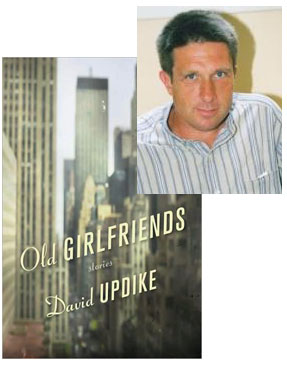David Updike and the Fool’s Errand of “Araby”

After reading David Updike’s “Selling Shorts” guest essay this weekend, I felt like I’d been let in on a secret running through several of the stories in his latest short story collection, Old Girlfriends, an undercurrent of equal parts confusion and compulsion. There’s plenty of other things going on in these stories—”A Word with the Boy” and “Love Songs from America,” for example, tap into those moments when fathers realize they can’t protect their sons from the world, and how such moments affect their relationships with both sons and world—but even those Updike characters making a conscious effort to understand their emotional lives, like the in-analysis protagonist of the title story, find themselves stumbling through incidents they can’t quite get a grasp on, wondering how they’re going to make it through.
It may have been in high school that I first read the story, or maybe college, in the freshman writing class for in which I received a C on every paper I wrote and also for the final grade. And I must have carried a tattered copy of James Joyce’s Dubliners when I took a semester off two years later, and made my own ill-planned visit to Ireland, in the middle of January. I spent several lonely weeks in chilly bed and breakfasts, pubs where all backs seemed to turn toward me when I came in, after wandering for hours through the gray cold streets of Dublin with my camera and red backpack.
But whenever I read this short story, “Araby,” it struck a chord in me, echoed some of my own, deep childhood preoccupations: the stubborn slowness of time; the hopeless longing for inaccessible, older girls; the inability of the adult world to be of much use to me in my private, emotional quests. There was also the beauty of language, of words being used in strange and pliable ways:
“The cold air stung us and we played until our bodies glowed. Our shouts echoed in the silent street. The career of our play brought us down through the dark muddy lanes behind the houses where we ran the gauntlet of the rough tribes from the cottages, to the back doors of the dark dripping gardens where odours arose from the ash pits, to the dark, odorous stables where a coachman smoothed and combed the horse or shook music from the buckled harness.”
I could hear this music, knew well the glowing bodies in cool air at dusk on autumn afternoons, the air smelling of burning leaves. And then, the crux of the matter, girls like Mangan’s older sister, impinging herself on our simple, boyish needs: “She was waiting for us, her figure defined by light from the half opened door. Her brother always teased her before he obeyed and I stood by the railings looking at her. Her dress swung as she moved her body and the soft rope of her hair tossed from side to side.”
The soft rope of her hair! Her dress swung as she moved her body! I, too, had been haunted by the clothes and mysterious movements of older sisters—their distant carelessness, vague awareness that they were being noticed, willingness to draw me toward them.
6 September 2009 | selling shorts |
Songs & Literature: Sarah Rainone, Rakesh Satyal, & the Bushwick Book Club, May 2009
Back in May, the Mercantile Library Center for Fiction and I threw a pre-BookExpo America party for debut novelists Sarah Rainone and Rakesh Satyal. Those who attended could tell you what an awesome time it was, but thanks to Regal Literary you can also see much of the evening for yourself! Here’s footage of Sarah, performing as one of the characters from Love Will Tear Us Apart.
And here’s Rakesh, reading a scene from Blue Boy (and saying some very kind things about Beatrice and GalleyCat for which I’m truly grateful).
Oh, by the way, in his introductory remarks, Rakesh thanks “Susan” for “that wonderful, wonderful song.” That’s Susan Hwang of the Bushwick Book Club, one of several members from the Club who performed original songs inspired by both novels that evening. Regal Literary was kind enough to upload footage of Susan’s performance as well…
3 September 2009 | events |

 Our Endless and Proper Work is my new book with Belt Publishing about starting (and sticking to) a productive writing practice.
Our Endless and Proper Work is my new book with Belt Publishing about starting (and sticking to) a productive writing practice. 
